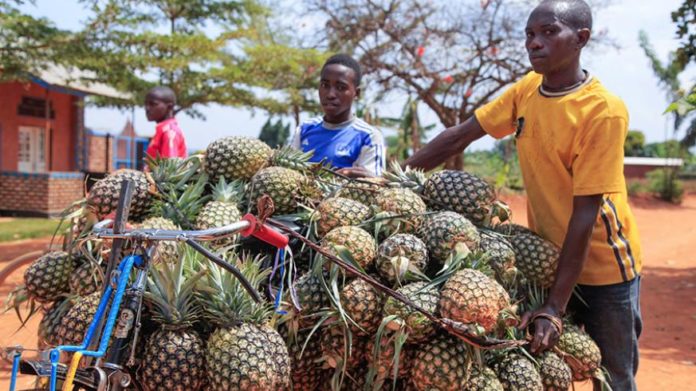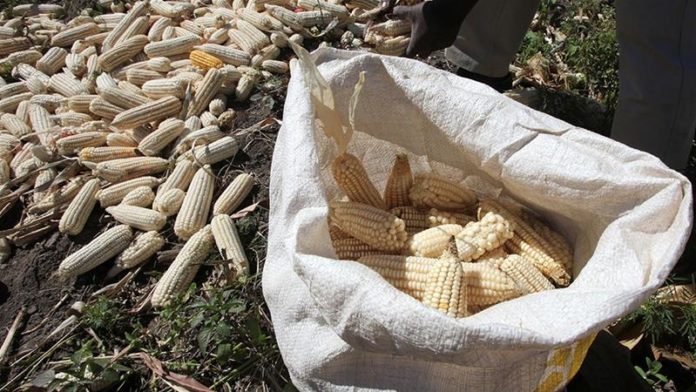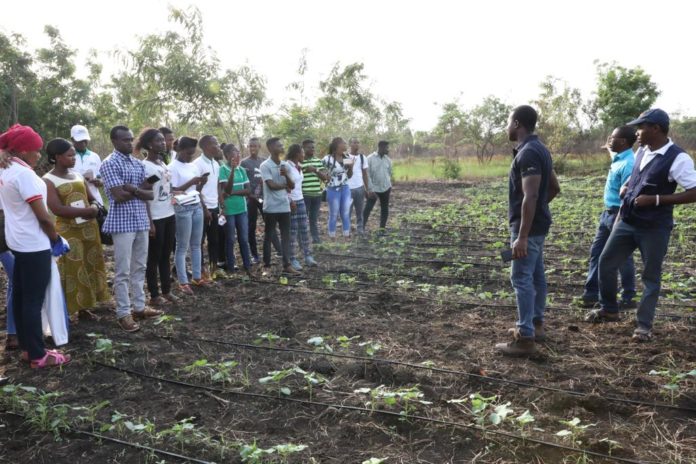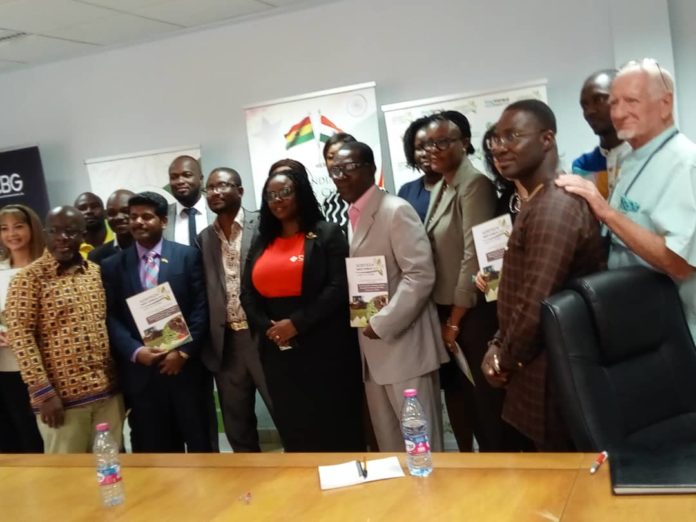The Deputy Chief Executive in-charge of Operations, Ghana Cocoa Board, Dr. Emmanuel Opoku has assured cocoa farmers that by October this year, Ghana will start using Digitized Weighing Scale.
Malta High Commissioner pays a working visit to NEIP. – Promises to support government’s entrepreneurship agenda.
The High Commissioner of Malta has expressed his country’s interest to support entrepreneurs and businesses in Ghana.
Farmers stuck with pineapples as prices drop to Shs 700.
The price of pineapples in Luweero district has dropped from Shs 2,000 to Shs 700 per piece following a bumper harvest.
The 3rd Edition of Agricultural Students Career Guidance and Mentorship Dialogue (AG-STUD) Bootcamp 2020. launched.
The 3rd Agricultural Students Career Guidance and Mentorship Dialogue (AG-STUD) Bootcamp 2020 under the theme: Growing the Future: Establishing the Agri Youth, has been launched at Coconut Groove Hotel, Accra by Agrihouse Foundation.
Zimbabwe’s Farmers Lament: ‘The Taxes Are Just Too Much’.
Zimbabwe’s agricultural minister told officials this week that the country has only 100,000 tonnes of maize left in its strategic reserves – enough to last just over a month.
Ardhi Investment Group’s Greenhouse Project Opens.
Ghana is ranked 93rd in the world in imports. Statistics indicate that Ghana spends over US$100 million on the importation of vegetables annually. The vegetables imported are mostly tomatoes and onions from neighbouring countries. This compelled Ardhi Investment Group with support from HortiFresh to construct a greenhouse project to produce quality and healthy vegetables for the local market to help reduce vegetable importation.
Agrihouse Foundation: Exerting Influence and Making Impact for 2020 and Beyond.
For many within and without the Agriculture industry, the term ‘agriculture’ resonates with mental images of hoes, cutlasses, vegetation-and recently, mechanized farming, pesticides, and fertilizers. This mundane view of agriculture through age-old has endured because most industry firms centred their operations and service delivery on farm-specific endeavours.
U.S. Supreme Court signals interest in child-slavery cocoa lawsuit.
The U.S. Supreme Court signaled interest in giving companies a broader shield from lawsuits by victims of overseas atrocities, asking the Trump administration for advice on a case stemming from child slavery on cocoa farms in the Ivory Coast.
Nestle’s U.S. unit and Cargill Inc. are urging the court to end a suit that accuses them of complicity in the use of forced child labor in the African country. The Supreme Court on Monday asked U.S. Solicitor General Noel Francisco to advise whether the justices should hear the companies’ appeals.
The case would test a centuries-old law, the 1789 Alien Tort Statute, that became a favorite tool of human-rights activists before the Supreme Court started scaling it back. The court decided in 2013 that the law generally doesn’t apply beyond U.S. borders, and in 2018 that foreign corporations can’t be sued in that context.
But a federal appeals court said the allegations against Nestle and Cargill might have enough of a U.S. connection if the plaintiffs amended their lawsuit to provide more specifics.
“The allegations paint a picture of overseas slave labor that defendants perpetuated from headquarters in the United States,” the San Francisco-based appeals court said.
The case, filed by six former slaves who were kidnapped from their native Mali, has been moving up and down the federal court system since 2005. The companies are accused of aiding and abetting slave labor by giving Ivory Coast farmers financial assistance in the expectation that cocoa prices would stay low. The suit alleges the companies were fully aware that child slavery was being used.
The ex-slaves say children were forced to work as much as 14 hours a day, given only scraps to eat, and were severely beaten or tortured if they tried to escape.
In its appeal, Nestle USA said the plaintiffs “have not even alleged that their injuries can be traced to the domestic conduct of a defendant.” The company said it “unequivocally condemns child slavery.”
Cargill said the plaintiffs “do not allege they worked on a farm from which Cargill purchased cocoa or to which Cargill provided any form of assistance.”
Combined, Ivory Coast and Ghana produce almost 60% of the world’s cocoa, according to the U.S. Labor Department’s Bureau of International Affairs.
“Latest estimates found 2 million children engaged in hazardous work on cocoa farms in these two countries,” the bureau says on its website.
In 2001, several chocolate giants — including Nestle — entered into an agreement to eliminate by 2005 “the worst forms of child labor” in the growing and processing of the cocoa beans they use. The deadline has been extended multiple times. There’s now a target of reducing such labor 70% by this year, but the Washington Post has reported that the companies probably won’t meet that timeline either.
Last year, two U.S. senators — Democrats Sherrod Brown of Ohio and Ron Wyden of Oregon — asked customs officials to block Ivorian cocoa imports unless the shipments could be certified as free of child labor. A federal investigation into the matter started in October.
Multinational companies have faced dozens of suits accusing them of playing a role in human rights violations, environmental wrongdoing, and labor abuses.
The 3rd Agric Students Career Guidance and Mentorship Dialogue Set for March.
The 3rd edition of the Agric Students Career Guidance and Mentorship Dialogue Boot-camp (AG-STUD) 2020 is scheduled to take place on Tuesday, March 10th to Friday, March 13th, 2020 at the Coconut Groove Hotel, Sakumono, Accra.
Agritech West Africa 2020 launched.
The agriculture sector in recent years has appreciated significantly with the introduction of agronomical practices, improved seeds, technology and many more, yet the sector has not been fully utilized.














